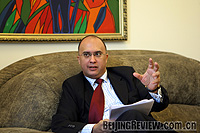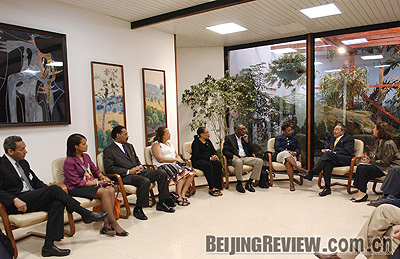|
 |
|
"The Cuban Government wants to see what the Obama administration does instead of listening to what it says."--Carlos Miguel Pereira Hernandez, Cuba's Ambassador to China (JIANG XIAOYING) |
In March, the U.S. Congress decided to loosen travel restrictions for Cuban Americans visiting their relatives in Cuba. The Caribbean island nation has been under a commercial, economic and financial embargo imposed by the United States since 1962. Beijing Review reporter Yan Wei spoke to Cuba's Ambassador to China Carlos Miguel Pereira Hernandez about the positive signs between Cuba and the United States as well as China-Cuba relations.
Beijing Review: What implications do you think America's easing of restrictions on Cuba will have for the two countries' relations? What are your expectations for the development of Cuba-U.S. relations under the Obama administration?
Carlos Miguel Pereira Hernandez: The U.S. embargo against Cuba is a complicated political issue. In his election campaign, Obama did not promise to lift the embargo but to introduce some flexible measures. He has made no fundamental change to America's policy toward Cuba in the past nearly 100 days since he took office. However, there have been some positive opinions on Cuba-U.S. relations in the U.S. Congress. For example, it passed a bill allowing Cuban Americans to visit their relatives in Cuba once a year, putting an end to the measures adopted by former U.S. President George W. Bush in 2004 to tighten the U.S. embargo against Cuba. The United States still bans its citizens from traveling to Cuba. The Obama administration is also reluctant to implement the policy adopted by Congress enabling Cuba to purchase food and other necessities from the United States without having to pay in cash in advance.
 |
|
DIALOGUE: Cuban President Raul Castro (second right) meets with U.S. lawmakers on April 6 in Havana. U.S. lawmakers visited Cuba amid reports that President Barack Obama was planning to ease economic sanctions, including travel restrictions for Cuban Americans(XINHUA/AFP) | The Cuban Government wants to see what the Obama administration does instead of listening to what it says. Obama has an opportunity to change America's policy toward Cuba. Unlike Bush, he did not make any direct promises to Miami's Cuban Americans opposed to Cuba's revolution. We have a positive attitude toward the Obama administration's new measures, which are minor changes in America's Cuba policy. They are in the right direction but far from enough.
Will these measures deliver tangible benefits to Cuba's economy?
The measures have a humanitarian touch, which I think is the most important. In 2004, Bush tightened restrictions by limiting Cuban Americans' travel to Cuba to once every three years and only allowing them to visit close relatives. With the new measures, they can visit close relatives as well as cousins, nieces, nephews, aunts and uncles once every year. Their visits can help improve their relatives' lives. But given the current economic difficulties, they will not have any major effect on Cuba's economy. I believe the new policy's humanitarian significance far outweighs its implications for Cuba's economic development.
What is the significance of the major government shake-up launched by President Raul Castro in early March?
The adjustment did not come all of a sudden. Raul Castro planned to adjust government agencies to make them more efficient long ago. Western media say he initiated a government shake-up to meet his political goals. In fact, that is not the case.
Like other countries, Cuba has suffered from the global financial crisis, as evidenced by its food and fuel price hikes. The Cuban Government has taken a series of measures to promote the country's economic development and improve its agriculture and food production. It is also committed to encouraging exports, substituting imports and attracting foreign investment, especially in the tourism sector.
How do you comment on the development of China-Cuba relations?
For Cuba-China relations, 2008 was a truly important year. The major events we experienced last year attested to our long-term cooperation, friendship and mutual support. For example, Cuba sent a 36-member medical team to earthquake-ravaged Sichuan Province to help treat the injured. China was the first country to provide assistance to Cuba after it was hit by hurricanes at the end of last year.
| 